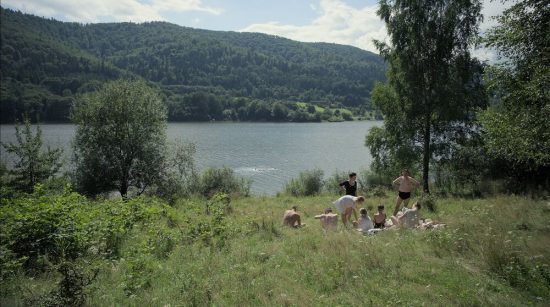Cannes Film Festival Review – The Zone of Interest – “A film that unapologetically makes its audience feel uneasy”
Acclaimed by the critics and winner of the Grand Prix at the 76th Cannes Film Festival, The Zone of Interest is one of the titles that received the most attention during this year’s festival. At the same time, out of all the movies I saw at the Cannes Film Festival, The Zone of Interest was definitely the hardest one to watch. And perhaps that is the whole point of Jonathan Glazer’s (Under The Skin) latest movie. After all, a film about a Nazi commander responsible for killing countless lives raises complex questions on the ethics of portraying such a topic on screen, all of which The Zone of Interest certainly takes strongly into consideration.
The Zone of Interest is loosely based on a homonymous 2014 novel by Martin Amis, telling the story of a Nazi officer. In fact, Glazer’s film follows Rudolf Höss (Christian Friedel), the commandant of the Auschwitz concentration camp, as he builds his ideal life with his wife Hedwig (Sandra Hüller) and children in what initially looks like a fantastical house in the countryside of Germany. However, it becomes soon evident that behind this dream-like façade, there is a much darker truth, that of the Auschwitz concentration camp just a few feet away from them, the horror of which Höss is heavily involved in.
The movie differs significantly from the book in various aspects. Most strikingly, Glazer chooses to maintain the names of the real-life individuals involved in the events, instead of using their fictionalized counterparts of the Amis’ book, thus underlying the accountability of those involved in the crimes of the Holocaust. Because of this, The Zone of Interest is perhaps an accurate visual portrayal of Hannah Arendt’s concept of the banality of evil. Ultimately, Höss is much more than a villain of this story, he is the reflection of how real-life evil can be found in seemingly everyday life and people. In fact, he is not inherently evil. Instead, Höss seems to be leading an ordinary life, committing these atrocities not because he actively seeks to do so but rather simply because it is his job, which may be even more terrifying.
Shot after shot, the audience witnesses the seemingly meaningless and repetitive actions that define Höss’ life, but we hardly ever forget what is really behind them, poignantly underlined by the ending of the film. In this sense, The Zone of Interest forces us to sit with the discomfort caused by this film. The long shots make us linger on Höss and his family, even when we would want to look away, thus creating an uncomfortable and harrowing portrayal of the family’s life. In a certain sense, then, the dialogue and the plot of the movie are not nearly as relevant as the experience of witnessing the Holocaust from an unusual angle, that of the oppressor in one of the most horrifying moments of modern history.
The uneasiness we perceive while watching the movie also comes from a lack of focus on the characters. They are somewhat alien to us, almost robotic in their actions and, as an audience member, I could not feel any further away from them. The separation between us as the audience and the characters on screen are expressed visually through the absence of close-ups and the use of long shots: we only see them in long shots, thus highlighting this emotional distance and the dehumanization of the characters themselves. In this sense, we are not supposed to feel any empathy towards Höss but rather feel repulsed by him and his actions and that may be why it is such a difficult film to watch.
Although physically shot in Auschwitz, the film remarkably does not show any actual violence. Interestingly, The Zone of Interest chooses to never show the concentration camp, even if Höss’ life revolves around it. This makes the ending even more impactful. At the end of the film, the shot of Höss descending on a round staircase is intercut with shots that evoke the horror of what happened: countless abandoned children’s shoes, and clothes on display. Once again, Glazer only suggests the horror by alluding to the high number of lives that we’re lost, rather than recreating the horror of the Holocaust. This also serves as a reminder that we cannot forget what happened, as Glazer focuses on showing things that we would nowadays find in a museum. While this is the most striking and impactful part of the movie, I wish such a juxtaposition had been suggested earlier on in the film rather than only in its final sequence.
Ultimately, The Zone of Interest is a film I am glad to have seen but one I don’t think I could ever watch again. And maybe that is the point of Glazer’s film. Witnessing Höss going on about his daily life like any other person in any other job when we know he is greatly responsible for the Holocaust, as emphasized by the final montage, is meant to be uncomfortable. The Zone of Interest is a film that unapologetically makes its audience feel uneasy. The distress the film can create is essential to portray the troubling storyline of the film, thus allowing a poignant reflection on the horrors of the Holocaust and its perpetrator without showing any violence in the movie itself.










